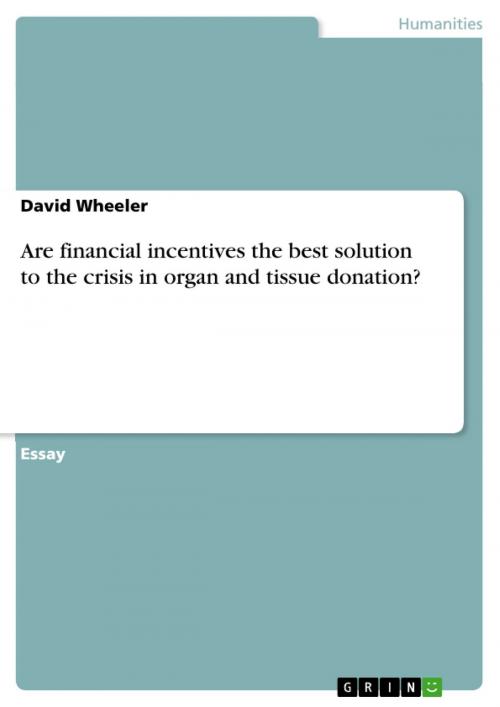Are financial incentives the best solution to the crisis in organ and tissue donation?
Nonfiction, Religion & Spirituality, Philosophy, Ethics & Moral Philosophy| Author: | David Wheeler | ISBN: | 9783640959051 |
| Publisher: | GRIN Verlag | Publication: | July 14, 2011 |
| Imprint: | GRIN Verlag | Language: | English |
| Author: | David Wheeler |
| ISBN: | 9783640959051 |
| Publisher: | GRIN Verlag |
| Publication: | July 14, 2011 |
| Imprint: | GRIN Verlag |
| Language: | English |
Essay from the year 2011 in the subject Ethics, grade: 2.1, Churchill College, Cambridge (-), language: English, abstract: For financial incentives to be considered as the best form of solution to the crisis in organ and tissue donation, they have to work effectively and work better than alternative solutions. Examples of financial incentives working include Germany's use of reductions in social insurance contributions if citizens attend smoking cessation sessions, screenings and dieting classes and a recent U.S. study which found that over a 3-month period participants offered $14 per percentage point of weight loss lost 4.7 pounds and participants offered $7 per percentage point of weight loss lost 3.0 lb compared with 2.0 lb among control group participants 4 (those who received no financial incentive). These are but two examples from worldwide use of financial incentives in motivating and changing behavior. However, there are some issues with the effectiveness of financial incentives for organ and tissue donation, mainly those of the wide and popular range of alternatives and the lack of tangibility for financially incentivized post-mortem donation. The introduction of financial incentives could lead to a reduction in altruistic donations, opponents of financial incentives argue. This decline in altruistic donations will lead to an overall decline in donations and therefore make the crisis even worse. However, financial incentives can easily work alongside altruism, since those who donate altruistically do so for family or friends - people donate for different reasons, and there is no evidence that financial incentives would cause people to stop donating. Even if there is a reduction in altruistic donations these can be more than made up for by the increase in donations caused by financial incentives. The main alternative to financial incentives is the presumed consent or 'opt-out' system. Presumed consent asks the people to register to prevent their organs being used after death, as opposed to registering to allow use. This utilizes the perceived apathy of the population and increases the number of post-mortem donations dramatically without causing the same ethical and moral concerns as financial incentives. However, presumed consent has some serious problems, both practical and moral. It does not increase live donations whatsoever, and both people themselves and families of the deceased can simply refuse donation. It also raises questions regarding whether the state can claim people's bodies without permission.
Essay from the year 2011 in the subject Ethics, grade: 2.1, Churchill College, Cambridge (-), language: English, abstract: For financial incentives to be considered as the best form of solution to the crisis in organ and tissue donation, they have to work effectively and work better than alternative solutions. Examples of financial incentives working include Germany's use of reductions in social insurance contributions if citizens attend smoking cessation sessions, screenings and dieting classes and a recent U.S. study which found that over a 3-month period participants offered $14 per percentage point of weight loss lost 4.7 pounds and participants offered $7 per percentage point of weight loss lost 3.0 lb compared with 2.0 lb among control group participants 4 (those who received no financial incentive). These are but two examples from worldwide use of financial incentives in motivating and changing behavior. However, there are some issues with the effectiveness of financial incentives for organ and tissue donation, mainly those of the wide and popular range of alternatives and the lack of tangibility for financially incentivized post-mortem donation. The introduction of financial incentives could lead to a reduction in altruistic donations, opponents of financial incentives argue. This decline in altruistic donations will lead to an overall decline in donations and therefore make the crisis even worse. However, financial incentives can easily work alongside altruism, since those who donate altruistically do so for family or friends - people donate for different reasons, and there is no evidence that financial incentives would cause people to stop donating. Even if there is a reduction in altruistic donations these can be more than made up for by the increase in donations caused by financial incentives. The main alternative to financial incentives is the presumed consent or 'opt-out' system. Presumed consent asks the people to register to prevent their organs being used after death, as opposed to registering to allow use. This utilizes the perceived apathy of the population and increases the number of post-mortem donations dramatically without causing the same ethical and moral concerns as financial incentives. However, presumed consent has some serious problems, both practical and moral. It does not increase live donations whatsoever, and both people themselves and families of the deceased can simply refuse donation. It also raises questions regarding whether the state can claim people's bodies without permission.















